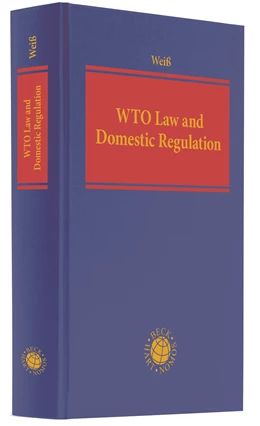Weiß, WTO Law and Regulation, 2020, C.H.Beck

Wolfgang Weiss
WTO Law and Domestic Regulation
Exploring the Determinants for the Impact of the WTO on Domestic Regulatory Autonomy
Handbook
München: 2020, C.H.Beck, 455 S., 180,00 Euro incl. VAT
In English
ISBN 978-3-406-74410-5
– In Gemeinschaft mit Nomos Verlagsgesellschaft, Baden-Baden und Hart Publishing, Oxford –
www.beck-shop.de
This book explores the impact of WTO law on domestic regulatory autonomy. It identifies and critically analyses the mechanisms working in WTO law that cause increasing interferences with domestic law and thus restrain the regulatory autonomy of the WTO members. The book proposes ways how WTO law be conceptualized to enhance the policy space of WTO members. Therefore, the book demonstrates the flexibilities in interpreting and applying WTO core principles and provisions and explores interpretive and institutional conceptions that could serve as a pathway of allocating greater policy leeway to WTO members. This work contains authoritative information on the relationship between WTO law and national or supranational law, since in this respect there are implementation obligations under international law, the scope of which is not always clear.
The analyses presented address the disturbing observation that even though WTO law appreciates the regulatory leeway of WTO members in several provisions across agreements, the WTO judiciary´s case law, but also other governance mechanism active in the WTO appear to narrow down the WTO members´ regulatory autonomy and to considerably limit the space for domestic policy choices. Wide spread, even scholarly perception of the WTO, and most recently the then Trump administration blame the WTO, in particular its dispute settlement branch, for being biased towards free trade and unduly restraining even legitimate domestic policies, and voiding the domestic policy space needed for addressing societal concerns and global problems.
A closer look at the development of GATT/WTO law, however, reveals that, in GATT era, panels were aware of the effect their interpretations had on domestic policy space, and that some of the more recent WTO dispute settlement reports show attempts to expand WTO member´s leeway again. These observations are the starting point for an indepth analysis of the different mechanisms present in WTO law which impact on domestic regulation. The book goes into detail on the relevant case law – especially of the WTO panels – and works through its significance for the legislative process in detail.
Readers learn that WTO rules are amenable for conceptualisations that enlarge domestic policy space, get to know concrete proposals insofar, and understand the institutional preconditions for their implementation. The analysis identifies the relevant determinants insofar, and proposes interpretative approaches of the existing WTO rules that if applied would allow for enlarging the domestic policy space of the WTO members. The research shows how stipulations for protection of demestic regulatory autonomy of the WTO members, which have a legitimate anchor in existing WTO rules, can be taken more serious and be implemented more comprehensively than done in the currently prevailing conception of WTO law by the WTO dispute settlement practice.
The author
Wolfgang Weiss is Full Professor of Public Law, European Law and Public International Law at the German University of Administrative Sciences Speyer.
